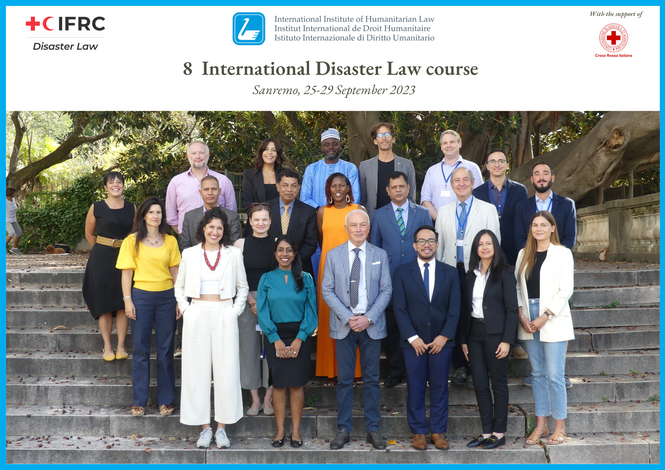
The five-day course organised at the International Institute of Humanitarian Law by IFRC Disaster Law with the support of a group of Italian scholars and the Italian Red Cross provided participants with an overview of existing international law and key regulatory issues related to the prevention and management of disasters with a focus on challenges raised by pandemics.
Tommaso Natoli, one of the course directors and IFRC Disaster Law Focal Point for Europe said the course is important as we face more extreme weather events than ever before, the impacts of climate change and as we emerge from a pandemic, legal frameworks in a disaster setting are very pertinent.
“In light of the fact that states are discussing a potential adoption of a new treaty based on the United Nations International Law Commission Draft Articles on the Protection of Persons in the Event of Disasters, the topic of disaster law is very current.”
While the course featured prominent disaster law experts, like Eduardo Valencia-Ospina, former Special Rapporteur of the International Law Commission on the above-mentioned Draft Articles, it was made up of a mix of humanitarian practitioners, academics, and experts.
“International disaster law is not exclusively a subject for legal experts, especially in this context where the knowledge of legislations and normative processes is key to ensuring an effective and efficient management of disasters and related crises”, said Tommaso Natoli.
Participant Q&A: Lina Marlene Dorado Gonzalez, Disaster Risk Management Team Leader at the Colombia Red Cross
What was the most interesting thing learned on the course?
The case studies of countries related to the application of international law, which allow the application of legal theory to be put into practice, especially proportionality in applying fundamental human rights seemed relevant to me.
How will you apply new knowledge from the course?
Colombia is a multi-risk country, where we find risks associated with natural phenomena, complex crises, and migration, where we must make contingency plans, so I will apply the knowledge acquired in the course in the plans, programs and projects of the National Society so that they are contemplating actions for appropriate decision making.
Why is it important that National Societies have knowledge of disaster law?
National Societies, in most countries, support the implementation of disaster risk management policies to governments, therefore their members must have knowledge of international disaster law, IFRC guidelines, and of course, articulate with the risk management policies of each country.
How will a strong legal framework for disasters help Colombia?
In Colombia, the National Society is part of the National Disaster Risk Management System, it is a member as determined by the national disaster risk management policy, it participates in decision-making bodies, then, to better perform the auxiliary role of the state, the National Society has a disaster risk management policy, which allows it to be an important active member of the national government, through the National Unit for Disaster Risk Management. This is the result of having a solid disaster policy.
Why would you recommend the course?
The course offers the possibility of improving knowledge regarding international disaster risk law, the most important thing is that it offers the possibility of articulation with the regulatory frameworks and resolutions of human rights, migration, and refugees, which allow us to have greater competencies for our roles in National Societies.